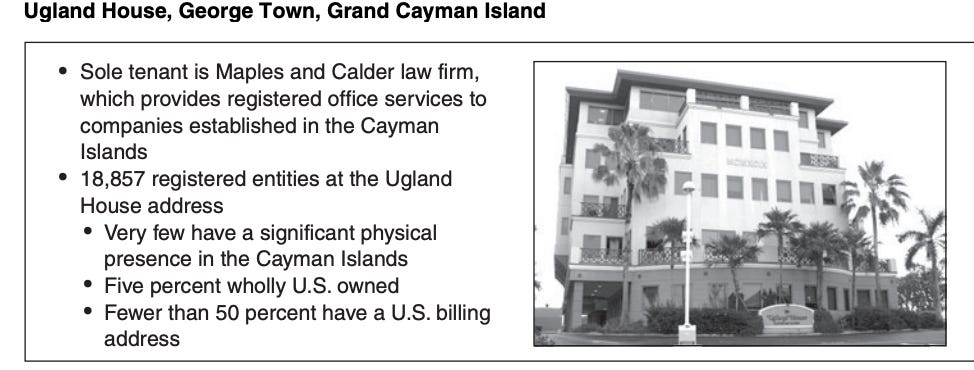From Enron to Brookfield: Ugland House Underscores Contrasts in Obama’s and Carney’s Crisis Campaigns
Once home to hundreds of Enron’s offshore entities, Ugland House—also the registry for Carney’s Brookfield—was cited by U.S. authorities in a sweeping probe of tax evasion and money laundering.
CAYMAN ISLANDS — Nestled among pastel buildings and swaying palms on South Church Street stands Ugland House, a modest five-story structure. In a world of increasingly digitalized finance, this Cayman Islands law office stands out for its bricks, mortar, and paper—the seat of a legal jurisdiction that hosts an estimated 20,000 corporate entities.
The wealth concentrated here became so notorious among Democratic U.S. lawmakers two decades ago—partly because oil giant Enron’s byzantine web of shell corporations was based here—that Ugland House drew scorn from Barack Obama during his 2008 populist campaign. After taking office, Obama moved quickly to channel Main Street’s anger over Wall Street excess and the collapse of the American homeownership dream. He held the Cayman address up as a symbol of systemic tax abuse, declaring it “either the largest building in the world—or the largest tax scam in the world.”
“With a stiff crackdown on offshore tax dodgers, President Barack Obama is trying to stay one step ahead of populist outrage,” Politico reported in 2009, “even as he scrounges for money to fund his extremely ambitious—and expensive—domestic agenda. Ugland House has become Exhibit A in Obama’s effort to focus public attention on tax cheats and offshore havens. And Obama knows his political opponents will have trouble defending it amid rising complaints about Wall Street rule-breaking.”
Today, the building remains symbolically loaded—and ironically relevant—as Canadian Prime Minister Mark Carney campaigns on promises to push back against Trump-era tariffs and deliver what he calls a fairer distribution of Canada’s wealth. Trumpeting a platform anchored by a jarring $130 billion infrastructure plan, Carney declared, “To succeed in a crisis, you have to act with overwhelming force.”
Yet multiple layers of irony emerge when comparing the crisis campaigns of Obama and Carney. Though both present as progressive leaders, the contrast becomes striking when considering that among the very cohort of offshore registrants once pilloried by Obama—including Enron—are more than a dozen entities linked to Brookfield Asset Management, the Canadian financial giant Carney once chaired.
There is no allegation of illegal conduct by Brookfield. But the optics of that shared address—long associated with tax minimization, financial secrecy, and frustration for U.S. investigators—place Brookfield in uncomfortable company.
Confronted on the campaign trail with questions about Brookfield’s offshore structuring, Carney said what matters is that companies “follow the rules… not just the letter, but the spirit, of those regulations.” He pledged that a Liberal government under his leadership would pursue a fair tax framework, ensuring that large firms “pay their fair share, regardless of where they operate.”
Still, Ugland House’s symbolic ties with Carney endure. A 2008 report from the U.S. Government Accountability Office (GAO) cemented its notoriety: “Financial activity in the Cayman Islands is measured in the trillions of dollars annually. One Cayman building—Ugland House—has been the subject of public attention as the listed address of thousands of companies.”
As the GAO noted, “U.S. persons who engage in Cayman-based financial activity commonly do so to gain business advantages, including tax advantages under U.S. law. Although such activity is typically legal, some persons have engaged in activity in the Cayman Islands in an attempt to avoid detection and prosecution of illegal activity by U.S. authorities.”
The GAO reviewed 21 cases involving U.S. taxpayers and Cayman-based entities, many registered at Ugland House and allegedly used in schemes involving tax evasion, securities fraud, and money laundering. “Several of the cases involved U.S. persons who allegedly used Cayman Island entities and bank accounts to conceal assets and income from U.S. tax authorities,” the report stated. “Other cases used complex financial structures to mislead investors or evade regulatory scrutiny.”
One such case involved a hedge fund registered at Ugland House, whose U.S.-based manager admitted to fraudulent conduct in a civil enforcement action by the Commodity Futures Trading Commission.
Maples and Calder—now operating as the Maples Group—remains the law firm most closely associated with Ugland House. It has helped create thousands of offshore entities for global banks, investment funds, and multinational firms—including Enron.
Few scandals better illustrate the risks of such structures than Enron’s collapse in 2001. At its peak, Enron maintained at least 441 Cayman entities, many created by Maples and Calder. GAO investigators later found these entities were central to Enron’s use of structured-finance schemes to manipulate earnings and mislead investors.
While Maples said it followed anti-money laundering and know-your-client protocols—and even filed a suspicious activity report tied to Enron—the firm acknowledged it had created Enron’s offshore vehicles at the request of major U.S. law firms. “The accounting fraud perpetrated by Enron was not intrinsically offshore in nature,” the firm told investigators. “Rather, it was committed from within the United States.”
Still, the Cayman Islands legal component was critical: Enron’s offshore entities helped the company obscure debt, inflate profits, and evade disclosure.
In Canada’s current election, the Brookfield–Ugland connection raises a deeper question: What responsibility do global firms—and the political leaders who once guided them—bear to avoid even the perception of offshore advantage and deepening inequality? Especially at a time when the economy is stagnating and younger generations view homeownership as increasingly out of reach—seemingly buoyed by flows of offshore capital and savvy domestic investors in cities like Vancouver, Toronto, and Montreal.
The contrasts between Obama’s crusade against offshore havens and Carney’s campaign are striking. One centered Ugland House as a symbol of what needed to be dismantled. The other, perhaps inadvertently, carries its shadow.





why use off shore tax havens when you can launder billions right in Canada's casinos and real estate, with impunity!
On the website OFFSHORE LEAKS DATABASE, hosted by the International Consortium of Investigative Journalists, Brookfield Asset Management shows up in 15 places in the Paradise Papers, mostly out of Bermuda. https://offshoreleaks.icij.org/nodes/80038758
Includes an entity involved with "Sustainable Development."